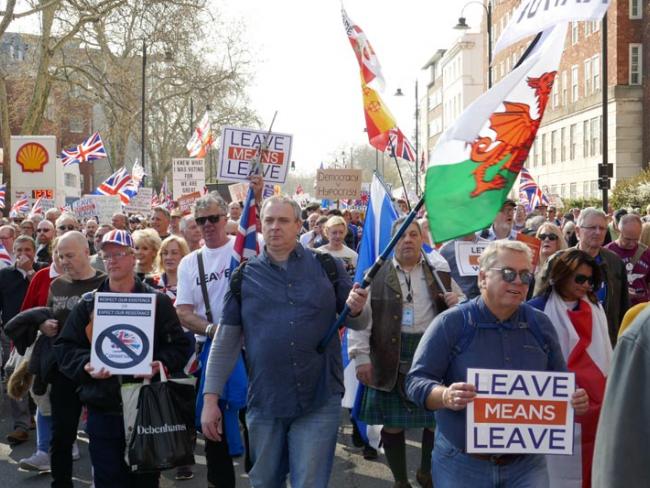
March 2019: demonstration in London. Photo Workers.
To raise the question of taking control runs counter to the world of politicians’ competing claims to act on our behalf…
Taking control: Sovereignty and Democracy After Brexit by Philip Cunliffe, George Hoare, Lee Jones and Peter Ramsay, paperback, 226 pages, ISBN 978-1509553204, Polity Press 2023, £13.90. Kindle and eBook editions available.
This thought-provoking book sets itself no less a task than to “…identify what more is needed to create a more democratic nation in which ordinary people can truly begin to take control of our collective life”. The authors, academics and researchers who campaigned assiduously for Brexit, take as their starting point the recognition that leaving the EU can only be a first step on the road to building democratic national sovereignty.
Raising this question of taking control of our own lives makes a sharp contrast to all the parliamentary political parties with their competing claims that we should elect them to run the country because they know what’s best for us.
The authors look in detail at the anti-democratic character of the EU. They argue that it is neither a benevolent pooling of national sovereignty nor a foreign superstate that “dominates its member states from without”. Rather, they assert it is a huddling together of European governments and their agencies who have “… abandoned their responsibility to their own citizens and avoid accountability for their policies and actions”.
Advocates of Britain’s continued EU membership often claimed it offered enhanced protection for workers’ rights. But here that argument is turned on its head with factual evidence that key rights were won by workers in Britain before the EU existed, and remain superior to EU minima in almost every respect.
The book places great emphasis on the voiding of national sovereignty which results when democratically elected leaders willingly sacrifice their autonomy. It outlines the key role of the Thatcherite counter revolution, which effectively stopped national development and deliberately made the state less responsive to popular demands.
The ensuing wholesale privatisations and accompanying mass unemployment compounded the growing sense of so many workers that the political establishment had no interest in understanding or acting to meet their material needs.
The stage was set for Brexit, a resounding declaration of a people’s desire to be recognised as an independent sovereign nation.
The knee-jerk explanations put forward by those who did not share this desire, that British people were gullible, racist, ill-educated little Englanders who didn’t know what was good for them are here systematically dissected and exposed as the lies they were.
These slanders on the electorate reveal most clearly the ruling class’s antagonism to any notion of being accountable to the people. In short, the thoroughgoing decay at the root of Britain’s representative democracy.
In this context, it has come as little surprise that the post-Brexit period has seen no real advance in British self-determination or sovereignty. The anti-Brexiteers, who continued to dominate in Parliament, ensured that what had been reliance on the EU was simply replaced by other forms of reliance. Underlying them all, “the market will provide”.
No plan, no concept
The authors note that while Boris Johnson and others were able to secure an enormous electoral victory in December 2019, on the back of a “Get Brexit done” campaign, they had no plan for any restoration of sovereignty, nor any real concept of what that meant.
Their lack of a vision for British manufacturing, energy, food production and other essentials for life and progress made them unable to develop the kind of independence that Britain needed. And their enthusiastic endorsement and promotion of the war in Ukraine signalled a further retreat from addressing deep-seated domestic problems. Despite its landslide victory a little over two years earlier, the Johnson government’s lack of real authority saw it implode in 2022.
‘It’s no surprise that the post-Brexit period has seen no real advance in sovereignty…’
The final chapter, “Taking Control: Towards a Democratic Britain”, details a series of proposals that the authors consider stepping stones on the road to reviving a democratic British nation. Firstly, as a counterblast to the globalists who currently dominate political and cultural life, they recommend that Britain withdraw from global alliances, most particularly NATO, an antithesis of national sovereignty.
Alongside that comes the call for a truly independent nuclear deterrent, effectively ending dependence on US policy. That would mean banishing American bases and weaponry from our soil.
A further proposal is that we embrace the re-unification of Ireland. That is a matter for the people of the whole of Ireland to decide, but it cannot be denied that the EU is exploiting northern Ireland as a debilitating toehold on British life and policy.
In the same vein, they suggest ending devolution, and that Britain relinquish overseas territories claimed by other sovereign peoples. There are further suggestions to democratise parliament by expanding it, to say one MP per 50,000 constituents, and to outlaw corporate financing of political parties. Also to abolish the House of Lords and to repeal all laws limiting political expression.
The book is limited by a lack of clarity on the question of class where it infers the existence of a middle class, references middle class union leaders and so on. It characterises unions as relics of the past, ignoring that they are the one creation of the working class that can serve their interests, (when they choose to use them, as in recent pay disputes).
But overall this is a brave and necessary attempt to make sense of the malaise of political life, and to recognise that this can only end when workers begin to take control.
